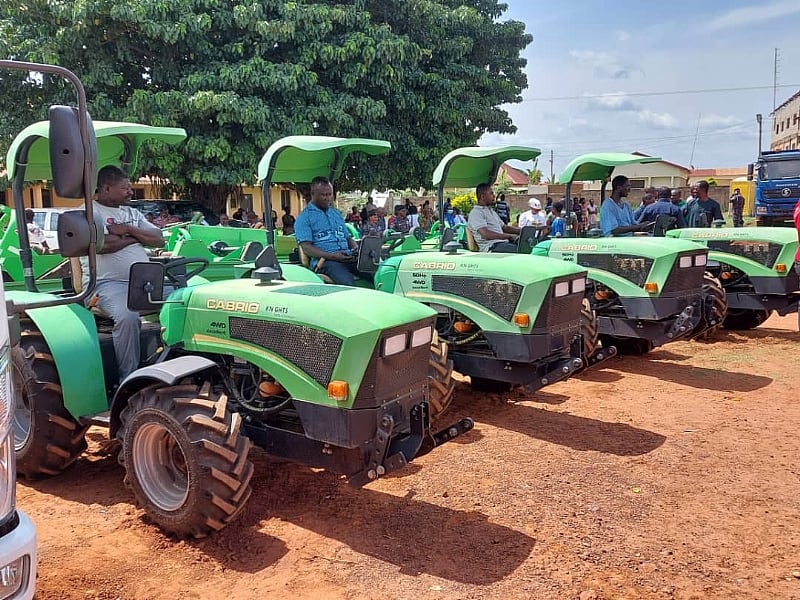The Feed Ghana Programme, a flagship initiative launched by President John Dramani Mahama, represents a concerted effort to bolster national food productivity and transform Ghana’s agricultural landscape. The program moves beyond mere policy pronouncements, representing a proactive approach to address challenges and unlock the sector’s potential as a driver of national growth and prosperity. The launch event in Techiman, Bono East Region, saw the President distribute essential agricultural inputs, including maize seeds, fertilizers, a Kia truck, and tractors to the Ghana Prisons Service and the National Service Authority, signifying the commencement of the program’s implementation phase. President Mahama emphasized the need for collective action and shared commitment from farmers, agribusinesses, financial institutions, development partners, and the broader community to maximize the program’s impact.
The Feed Ghana Programme encompasses a multifaceted strategy designed to enhance food production across various dimensions. Central to the program is the establishment of farmer service centers nationwide, equipped to provide comprehensive support to farmers. These centers will act as hubs offering mechanization services, access to high-quality inputs like seeds and fertilizers, financial assistance, market linkages, primary processing facilities, and crucial training opportunities. This integrated approach aims to empower farmers with the resources and knowledge necessary to boost their productivity and improve their livelihoods.
Land accessibility and utilization are also key focal points of the program. The establishment of farm banks or land banks in designated irrigable zones aims to provide young agri-entrepreneurs with access to land, fostering their involvement in agricultural activities and contributing to increased food production. This initiative recognizes the importance of engaging the younger generation in agriculture and providing them with the necessary support to thrive in the sector.
The Feed Ghana Programme prioritizes specific crops and livestock sectors to achieve significant production increases. Grains and legumes, including maize, rice, soya beans, and sorghum, are targeted for enhanced production to meet domestic consumption needs, support agro-processing industries, and generate export opportunities. The program also addresses the issue of vegetable imports, aiming to reduce reliance on neighboring countries by promoting local vegetable cultivation. This initiative, known as “Yeredua,” seeks to enhance self-sufficiency in vegetable production by empowering households and communities to cultivate crops such as tomatoes, peppers, and garden eggs.
Investment in controlled environmental farming techniques, such as greenhouse technologies, coupled with the promotion of urban and peri-urban agriculture, reflects the program’s commitment to modernizing agricultural practices. Encouraging schools to engage in backyard gardening further promotes agricultural awareness and self-sufficiency at the community level. Institutional farming is also emphasized, with support provided to institutions like Senior High Schools to access land for crop and livestock production. This initiative not only contributes to increased food production but also provides valuable educational experiences for students.
The revitalization of the poultry industry, a key component of the Feed Ghana Programme, is addressed through the “Nkoko Nketenkete” project. This initiative reflects a comprehensive approach to enhancing food security by focusing on various agricultural sub-sectors. By supporting diverse agricultural activities, the program aims to create a more resilient and sustainable food system.
The Feed Ghana Programme demonstrates a commitment to addressing the challenges facing Ghana’s agricultural sector through a multifaceted approach. By prioritizing farmer support, land access, targeted crop production, modern farming techniques, and livestock development, the program aims to achieve significant increases in food production, reduce reliance on imports, and create new opportunities for economic growth and prosperity. The program’s emphasis on collaboration and community involvement highlights the importance of shared responsibility in transforming Ghana’s agricultural landscape.
In conclusion, the Feed Ghana Programme represents a significant step towards achieving food security and agricultural transformation in Ghana. The program’s comprehensive strategy addresses key challenges in the sector and provides targeted support to farmers and agri-entrepreneurs. By promoting modern farming techniques, fostering youth involvement, and emphasizing local production, the Feed Ghana Programme lays the foundation for a more sustainable and prosperous agricultural sector. The President’s call for unity and shared commitment underscores the importance of collaborative efforts in achieving the program’s ambitious goals and transforming Ghana’s agricultural landscape.














